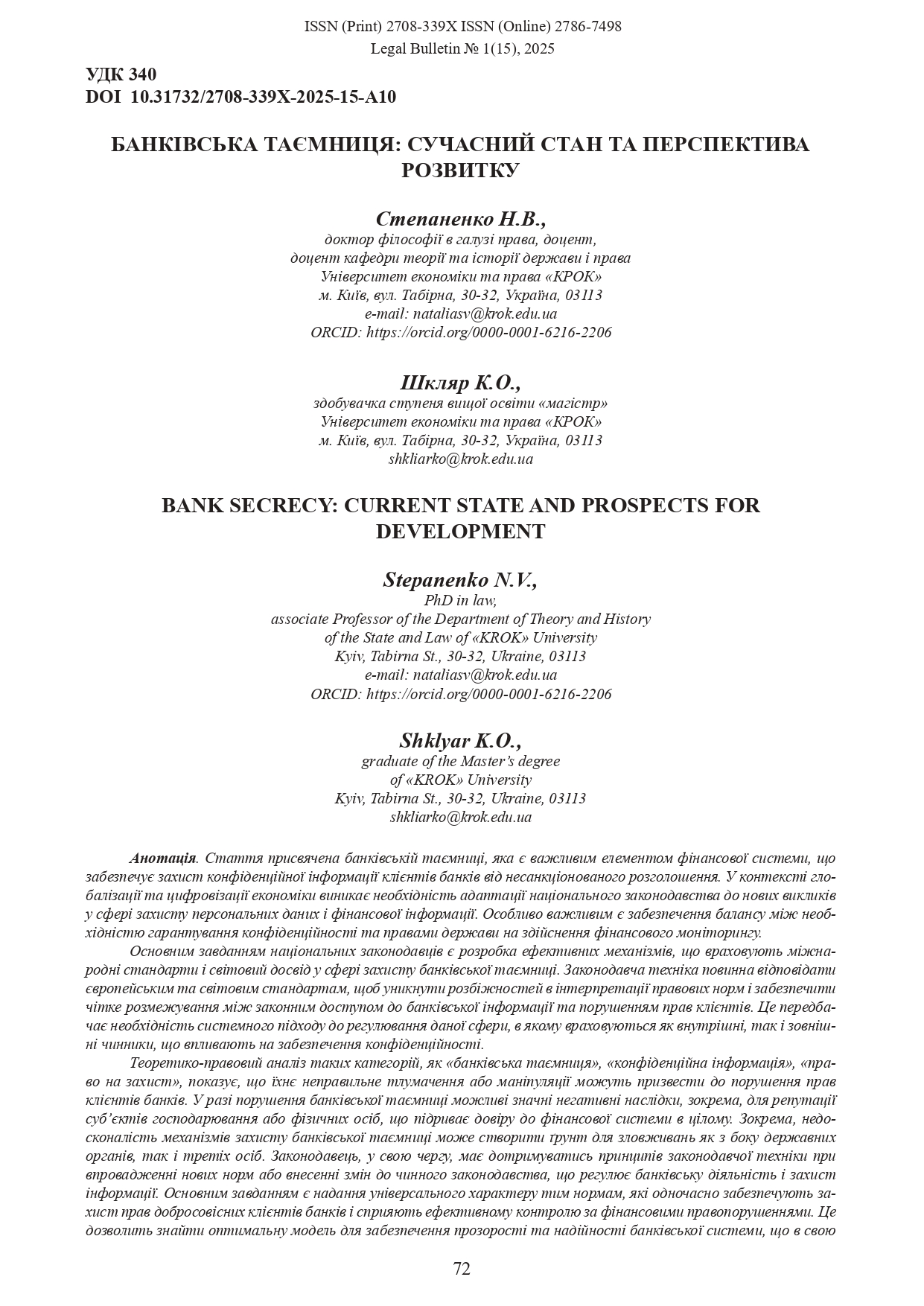BANK SECRECY: CURRENT STATE AND PROSPECTS FOR DEVELOPMENT
DOI:
https://doi.org/10.31732/2708-339X-2025-15-A10Keywords:
bank secrecy, confidential information, legal protection, bank clients, legislative technique, financial securityAbstract
The article is dedicated to banking secrecy, which is an important element of the financial system that ensures the protection of confidential information of bank clients from unauthorized disclosure. Particularly important is ensuring a balance between guaranteeing confidentiality and the state’s right to carry out financial monitoring.
The primary task of national legislators is to develop effective mechanisms that take into account international standards and global experience in protecting bank secrecy. Legislative techniques must align with European and international standards to avoid discrepancies in the interpretation of legal norms and to clearly distinguish between lawful access to banking information and violations of clients’ rights. This requires a systemic approach to regulating this area, considering both internal and external factors that influence confidentiality protection.
Theoretical and legal analysis of such categories as «bank secrecy», «confidential information», and «right to protection» shows that their incorrect interpretation or manipulation may lead to violations of bank clients’ rights. In the case of a breach of bank secrecy, significant negative consequences may arise, particularly for the reputation of business entities or individuals, undermining public trust in the financial system as a whole. Moreover, imperfections in the mechanisms for protecting bank secrecy may create grounds for abuses by both state authorities and third parties.
Legislators, in turn, must adhere to the principles of legislative technique when introducing new norms or amending existing laws that regulate banking activities and information protection. The main task is to provide universal applicability to the norms that simultaneously ensure the protection of the rights of law-abiding bank clients and contribute to effective control over financial offenses. This will allow finding the optimal model for ensuring transparency and reliability in the banking system, which, in turn, will contribute to strengthening financial stability and economic development.
References
Закон України «Про банки і банківську діяльність»: Закон від 07.12.2000 № 2121-III (ред. від 15.02.2011). Відомості Верховної Ради України. 2001. № 5-6. Ст. 30.
Постанова Верховної Ради України «Про боротьбу з відмиванням грошей»: постанова від 28.11.2002 № 249-IV. Відомості Верховної Ради України. 2003. № 1. Ст. 3.
Фулей Т. І. Банківська таємниця: правові аспекти. Київ: Юридична думка, 2015. 240 с.
Мельник О. В. Адаптація законодавства до вимог фінансових технологій. Харків: Право, 2019. 312 с.
Омельченко М. П. Державний контроль і банківська таємниця: конфлікти та рішення. Одеса: Одеський юридичний університет, 2018. 280 с.
Абрамов С. Н. Цивільний процес та права громадян на конфіденційність. Київ: Наукова думка, 2003. 198 с.
Козлов С. І. Штучний інтелект у банківській сфері: виклики і можливості. Київ: Видавничий дім «Юридична книга», 2021. 256 с.
Дзюбик І. І. Міжнародні фінансові зобов’язання та банківська таємниця / І. І. Дзюбик. Львів: Науковий центр правознавства, 2020. 310 с.
Литвиненко А. Ю. Кіберзлочинність у фінансовій сфері: нові загрози і захист / А. Ю. Литвиненко. Чернівці: Літера, 2019. 270 с.
OECD. Закон «Про прозорість податкових режимів». 2020. URL: https://www.oecd.org (дата звернення: 10.01.2025).

Downloads
Published
How to Cite
Issue
Section
License
Copyright (c) 2025 Степаненко Н.В., Шкляр К.О.

This work is licensed under a Creative Commons Attribution 4.0 International License.




